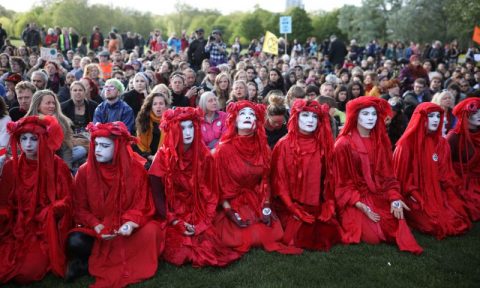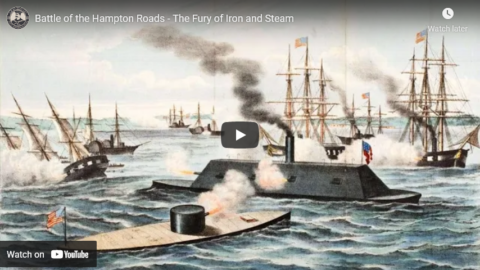Real Time History
Published 23 Sep 2021Sign up for Curiosity Stream and get Nebula bundled in and SAVE 26%: https://curiositystream.com/realtimehistory
While the Franco-Prussian War was raging in France, another armed conflict to the south was reaching its conclusion. The unification of Italy was not yet complete in the eyes of Italian nationalists because Rome and the Papal State still held out. After the defeat at Rome, the Papal Zouaves went on to France to fight the Prussians.
» THANK YOU TO OUR CO-PRODUCERS
John Ozment
James Darcangelo
Jacob Carter Landt
Thomas Brendan» OUR PODCAST
https://realtimehistory.net/podcast – interviews with historians and background info for the show.» LITERATURE
Arand, Tobias: 1870/71. Die Geschichte des Deutsch-Französischen Krieges erzählt in Einzelschicksalen. Hamburg 1870Bunnenberg, Christian: “Granaten sammeln. Totenkult und Tourismus auf den Schlachtfeldern”, in: 1870/71 – Der deutsch-französische Krieg und die Gründung des Kaiserreiches, ZEITGeschichte 4 (2020), S. 97.
Fiori, Simonetta: “Porta Pia. Roma libera e italiana”, in: La Repubblica v. 19.9.2020. o. S.
Pilant Paul: “La population messine pendant le siège de 1870”. In: La Révolution de 1848 et les révolutions du XIXe siècle, Tome 33, Numéro 158, Septembre-octobre-novembre 1936. pp. 141-175.
Plessner, Helmuth: Die verspätete Nation. Über die politische Verführbarkeit bürgerlichen Geistes. Kohlhammer, Stuttgart 1959
Seibt, Gustav: Rom oder Tod. Der Kampf um die italienische Hauptstadt. Berlin 2001
» SOURCES
Bazaine, François Achille: L’Armée du Rhin depuis 12. Août jusqu’ au 29. Octobre 1870. Paris 1872Braun, Lily (Hrsg.): Kriegsbriefe aus den Jahren 1870/71 von Hans v. Kretschman. Berlin 1911
Crombrugghe, Ida de: Journal d’une infirmière. Paris 1871
» OUR STORE
Website: https://realtimehistory.net»CREDITS
Presented by: Jesse Alexander
Written by: Cathérine Pfauth, Prof. Dr. Tobias Arand, Jesse Alexander
Director: Toni Steller & Florian Wittig
Director of Photography: Toni Steller
Sound: Above Zero
Editing: Toni Steller
Motion Design: Philipp Appelt
Mixing, Mastering & Sound Design: http://above-zero.com
Maps: Battlefield Design
Research by: Cathérine Pfauth, Prof. Dr. Tobias Arand
Fact checking: Cathérine Pfauth, Prof. Dr. Tobias ArandChannel Design: Battlefield Design
Contains licensed material by getty images
All rights reserved – Real Time History GmbH 2021
September 24, 2021
Italian Soldiers in France Fighting Germans I Franco-Prussian War 1870
From Handmaid’s Tale cosplay to eco-terrorism
Connor Tomlinson outlines the many performative and disruptive projects of Roger Hallam:
Insulate Britain gluing themselves to the M25 for a week has already produced a four-car collision, with victims airlifted to hospital, and delayed a mother’s treatment, leaving her paralysed by a stroke. Despite these events, activists claim they “don’t accept that we put lives at risk”. It’s vital that legal and cultural action is taken to insulate Britons from this dangerous brand of eco-extremism.
As Dan Wootton’s interview with activist Liam Norton explained, the endangerment of lives to exercise political pressure would classify Insulate Britain as ecological terrorists. The action Insulate Britain wishes to force government to take is “to produce within four months a legally binding national plan to fully fund” the insulation of all Britain’s 29 million homes with taxpayer cash. Essentially, they’re sitting in the motorway, blocking your work commute, so the state can take and spend more of your pay-check.
Insulate Britain is another in a long line of activist vanity projects engineered to make headlines by founder Roger Hallam. Starting with “Stop Killing Londoners” in 2017, Hallam went on to co-create Extinction Rebellion; before being ousted over his comments concerning the Holocaust. But Hallam’s alarmist and extremist rhetoric preceded this insensitive remark. In, 2019, Hallam said “forcing the governments to act” or “bring[ing] them down and create[ing] a democracy fit for purpose” will require “some [to] die in the process”. This “democracy” would, paradoxically, be a “socialist project”, with Hallam in the ideological driving seat.
Hallam’s prior protests demonstrated a similar indifference to human suffering. Hallam was arrested at Heathrow Airport for aiming to fly drones into active airspace and ground commercial flights. His “Heathrow Pause” protests constituted a terror threat, in that drones could cause flights to be grounded or collide and crash. Again, Hallam was willing to risk lives to make headlines.
All of these movements claim the sole solutions to apocalyptic emergencies are the appointment of Hallam himself to a position of public power which lets him implement whichever solutions he deems necessary. His PhD at Kings College on “civil disobedience” exposes Hallam’s own egoism in comparing himself to MLK and Gandhi. This was also an indictment of modern university radicalism; echoed by Dr. Charlie Gardner of the University of Kent making the same comparison in a lecture, calling himself “a hero of our times”, and refusing to disavow Hallam when I challenged him on it.
When I first heard of the M25 protests, I thought they’d be allowed to carry on for a token amount of time to get their actions into the media and then they’d be cleared off by the police. I was quite astonished to find that they were permitted to stay in place for several hours and that the police were being quite solicitous of their health and protecting them from any attempt at counter-protest by the stranded motorists. I’m now worried that the next time they try this, the motorists will have learned that the police aren’t there to enforce the law and be tempted to take it into their own hands.
Kill The Nazis – WAH 042 – September 1942, Pt. 1
World War Two
Published 23 Sep 2021The Nazi German occupiers have kept increasing their pressure in occupied territory, and fooled their victims to still have hope, but at some point when the oppression gets unbearable, or all hope is lost, people will resist.
(more…)
Jen Gerson has some helpful advice for the Conservative party
Writing in Maclean’s, Jen Gerson suggests to the “conservatives” that they shouldn’t dump their new-ish leader on the basis of the party’s results in the September 20 election:
It’s come to my understanding that there is some considerable consternation about the future of Erin O’Toole, leader of the Conservative Party of Canada, on the grounds that he underperformed in this week’s election.
I cannot help but wonder whether those now implacably resolved to booting the man for being inadequately conservative might, perhaps, consider getting a goddamn grip.
Yes, I understand that O’Toole ran his leadership campaign further to the right than his personality would otherwise suggest, in order to win over the Conservative base. And, yes, I understand that the unstated agreement behind this bait-and-switch was that O’Toole needed to show progress in key regions, particularly the 905. Also, yes, I understand that these gains failed to materialize, and that many conservatives feel both betrayed, and more importantly, no closer to government.
This state of affairs may ensure O’Toole’s leadership is unsalvageable.
Certainly, O’Toole and his brain trust seem to have rationally concluded that they could leave western conservatives hanging out to dry so they could chase votes in the GTA — because up until now, those westerners had nowhere else to go. However, the rise of the PPC suggests that they may now have somewhere to go …
Conservatives have a bad habit. They go into an election with reasonable expectations, enjoy some early momentum, and then let the excitement get to their heads. They reset those early expectations to something far less probable, and when the campaign produces exactly the results they predicted at the outset they declare the whole affair a disappointing failure.
I will note here that this complements the Liberal temperament, which interprets entirely lacklustre results as nothing short of a sign from the trumpet-wielding messengers of God blessing their mandate. Only the Liberals would see two successive minority governments with declining popular vote totals as clear-cut evidence that they, the worthy elect, have been chosen without reservation to lead the nation to paradise.
The Conservatives could use a little more of that energy.
These observations are provably true of both parties. The only amendment I could suggest is that the Liberals really do believe they have been granted the right to run Canada by divine providence (which few of them actually dare refer to in conversation) and view any interruption in their God-given right to rule as unnatural and a perversion of the arc of history.
Conservatives ought to have seen this election as the first in a two-election strategy. Fundamentally, the urbanites who hold the key to government don’t trust you, Conservatives. They’re worried about the conspiratorial lunatics in your caucus and your base, and they’re worried about who actually holds the reins of power in your party. Their distrust is fair, and will take time to repair.
If you dump your affable, moderate, centrist leader at the first opportunity because he didn’t crack the 905 on his first try, and you replace him with someone who will chase Maxime Bernier’s vanishing social movement like a labradoodle running after the wheels of a mail truck, you will wind up confirming every extant fear and stereotype this crowd already holds about you and your party.
It’s a trap. Be smarter than that.
The PPC nearly tripling the size of their vote over two years doesn’t quite match the characterization of a “vanishing social movement”, but I’m not who she’s trying to persuade here. It’s often said that modern “conservatives” don’t actually have a plan except to do what Liberals/Democrats want to do — just a little bit slower. O’Toole (and Ontario Tories generally) fits that description quite well.
Battle of the Hampton Roads – The Fury of Iron and Steam
Drachinifel
Published 20 Feb 2019The first ironclad vs ironclad battle is reviewed, along with the origins of the ships and some of the myths and legends about this historic battle.
Want to support the channel? – https://www.patreon.com/Drachinifel
Want to talk about ships? https://discord.gg/TYu88mt
QotD: The LGBT advocacy group Stonewall proves Hoffer right — “every great cause begins as a movement, becomes a business and eventually degenerates into a racket”
There is a law of nature that governs campaigning groups and charities, which is that an organisation set up to deal with a particular problem will always find a way to exist even after that problem has been addressed.
The reason is simple: by the time an issue has been solved, or almost solved, the business is at its peak. Employees’ salaries and pensions are at stake, reputations have been built and influence has been secured. And so it is that Eric Hoffer’s great insight is fulfilled: every great cause begins as a movement, becomes a business and eventually degenerates into a racket.
Very few causes have degenerated into a racket so completely as the former gay-rights group known as Stonewall. When it was founded in 1989, gay rights in Britain, as across Europe, had some way to go to reach equality. Back then, there was a different age of consent for homosexuals and heterosexuals, homosexuals did not have the right to marry or to have their partnerships legally recognised and, most pertinently, a Conservative government had made it impossible for young gay people to be in any way informed about their sexuality during their time at school.
There was certainly a long way to go, and Ian McKellen, Matthew Parris, Simon Fanshawe and the rest of the group’s founders faced an uphill battle for many years. But it was a battle which they helped to win.
Once most of their objectives had been achieved, though, what were Stonewall to do? There were several options in front of them. The most obvious, one might think, would have been to scale down and remain in place to deal with residual issues, such as the existence of homophobia in schools and other remaining pockets of society.
Douglas Murray, “How Stonewall sacrificed gay rights”, UnHerd, 2021-05-25.







